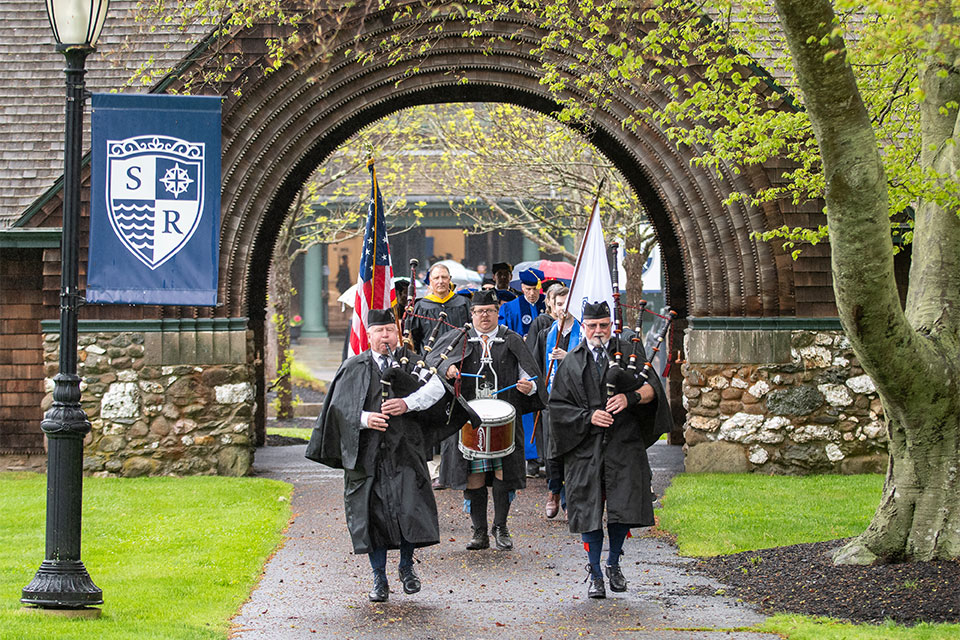Salve Regina awarded 22 doctoral degrees during graduate Commencement

Salve Regina awarded 19 Doctor of Philosophy (Ph.D.) and three Doctor of Nursing Practice (DNP) degrees during the graduate Commencement ceremony May 16.
Doctoral candidates in the low-residency humanities program examined the interdisciplinary question, “What does it mean to be human in an age of advanced technology?” This philosophical exploration interweaves humanities and technology, a relationship that captures society’s attention now more than ever.
The online doctoral program in international relations provides a rigorous education examining the complex questions of international affairs in the 21st century, empowering students to consider cultures around the world and value the wisdom gained through adventurous research in the field of international relations.
Doctoral candidates in the online nursing program explore evidence-based practice, quality improvement and systems thinking – preparing them for leadership roles as advanced practice nurses, managers of quality initiatives, executives in health care organizations, directors of clinical programs, and faculty responsible for clinical program delivery and teaching.
The 22 candidates and their dissertation titles were:
- Yaqueline Arjona (nursing): “More Than Magic, Radiation-Induced Oral Mucositis Prevention”
- Thomas Beall (international relations): “Military Effectiveness, Moral Injury and the Just War Tradition in Western History”
- Charles Black (humanities): “Inquiry Into the Transmutation of U.S. Special Operations Forces Social Kinds”
- David Blitch (humanities): “The U.S. Special Operations Command’s Hyper-Enabled Team: Daedalus and Icarus Redux?”
- Zachariah Dickens (international relations): “Departure From Neutrality: Normative Europeanization, Strategic Alignment and the Path-Dependent Case of Post-Cold War Swedish Integration Into NATO”
- Scott Efflandt (humanities): “The Erosion of Civic Virtue: How Recruiting Technology Changed the All-Volunteer Force”
- Eoghain Hamilton (humanities): “That Cloudy Place Where Stars Are Born: How the K’Iche’ Maya Construct Meaning From Death Rituals”
- Lorenzo Kellam III (humanities): “Empowering the Underserved Classroom: Web Technology as a Conduit for STEAM and Inquiry-Based Learning”
- Thomas Kerr (international relations): “State Sponsorship of Self-Determination Movements: Does Sponsorship Really Lead to Autonomy Concessions?”
- Ryan Kierman (international relations): “An Analysis of the Challenges of Islamic Vaccination Resistance to Disease Eradication Programs and Recommended Mitigations”
- Gerald Krieger (international relations): “China’s Foreign Policy in Saudi Arabia, the United Arab Emirates and the Islamic Republic of Iran: Exploring China’s Renewed Diplomacy in the Region”
- Ramy Makar (international relations): “Unraveling the Pseudo Statehood of Lebanon: A Critique of Consociationalism in Lebanon”
- Richard Mumford (humanities): “The Incorporation of an Ethics Framework in the Development of Emerging Information Technology Systems”
- Siobhan Mumford (humanities): “The Reading Wars: Ideological and Pedagogical Conflicts Ignited by the Writings of Rudolf Flesch”
- April McGrath (nursing): “Evaluation of a Leadership Focused Graduate Nurse Development Program”
- Daniel O’Keefe (humanities): “The Politics of Frivolity: American Neopopulism and Decadence”
- Daniel Reisner (international relations): “The Russo-Ukrainian Pre-War Crisis: A Comparative Test of Rational Choice, Expected Utility, Poliheuristic and Prospect Theories to Explain the War’s Outbreak”
- Karina Stiles-Cox (humanities): “Apping Back to Life: Mobile Phone Mediations in Refugee-Constructed Narratives of Forced Displacement”
- Oleg Tatsiyenko (nursing): “Effect of Short-Term Home Follow-Up Visits on Readmissions of Veterans With Heart Failure”
- Frances Thayer (humanities): “Ernest Hemingway: The Sustainable Effect of Creative Writing as a Therapeutic Technology Infused by Cubism”
- Paul Tilton (international relations): “Sociological Propaganda Through an Ellulian Lens: Developments in Modern China”
- Rachel Villari (humanities): “Transcending Dichotomies: Hilma af Klint’s Confluence of Science and Spiritualism in Atom and the Tree of Knowledge”

